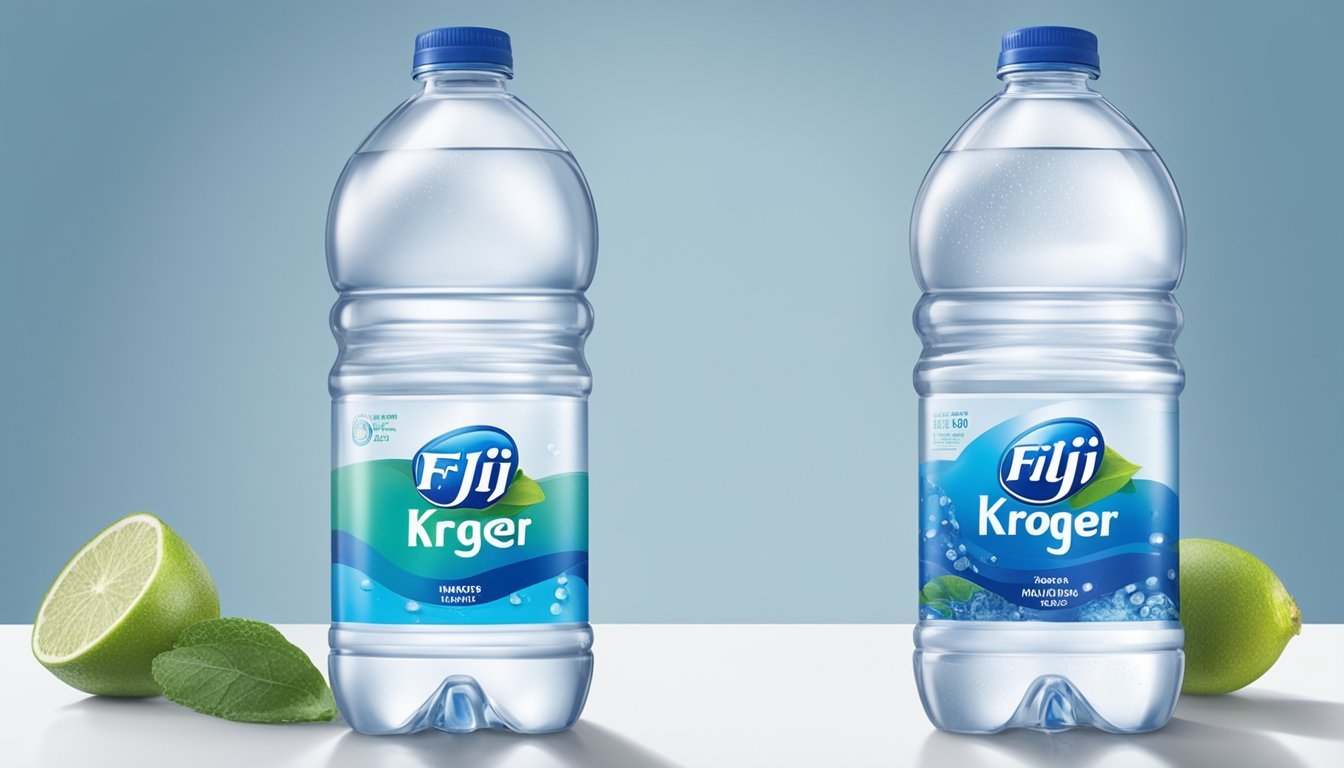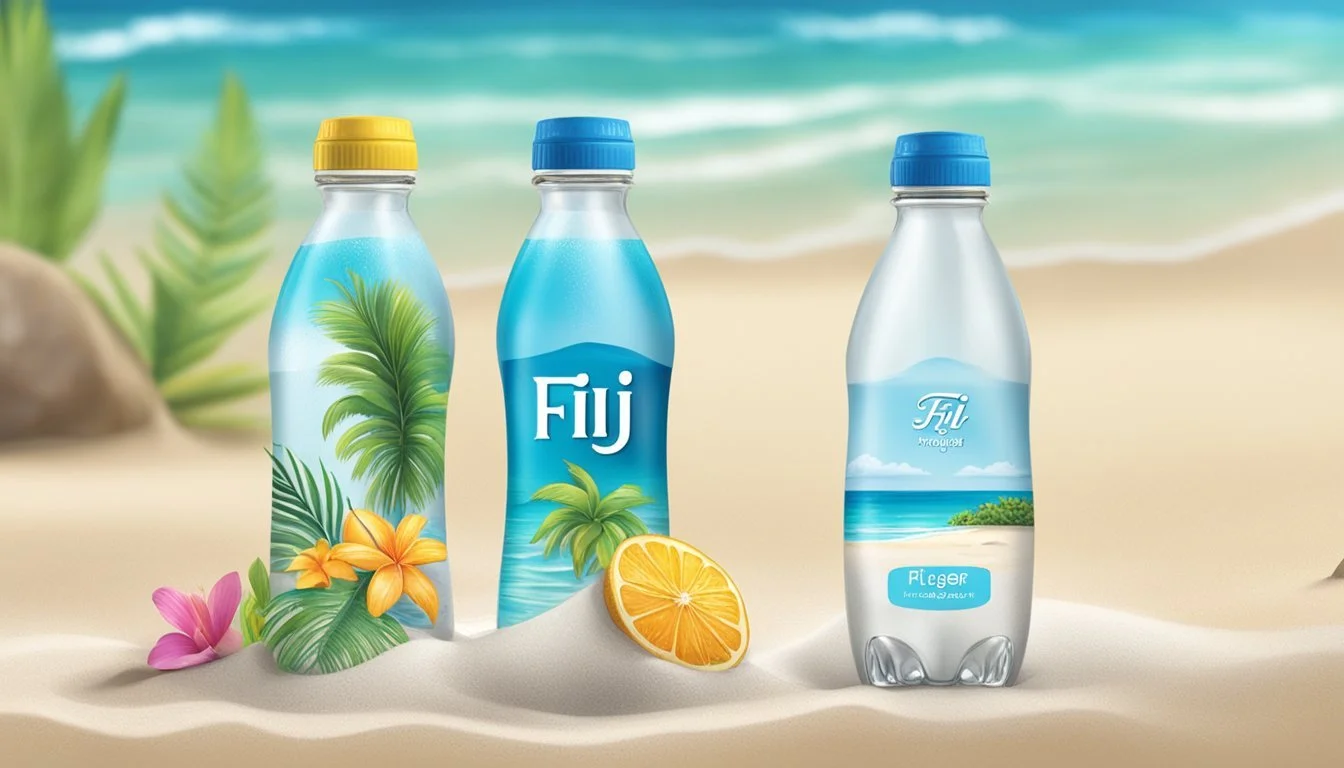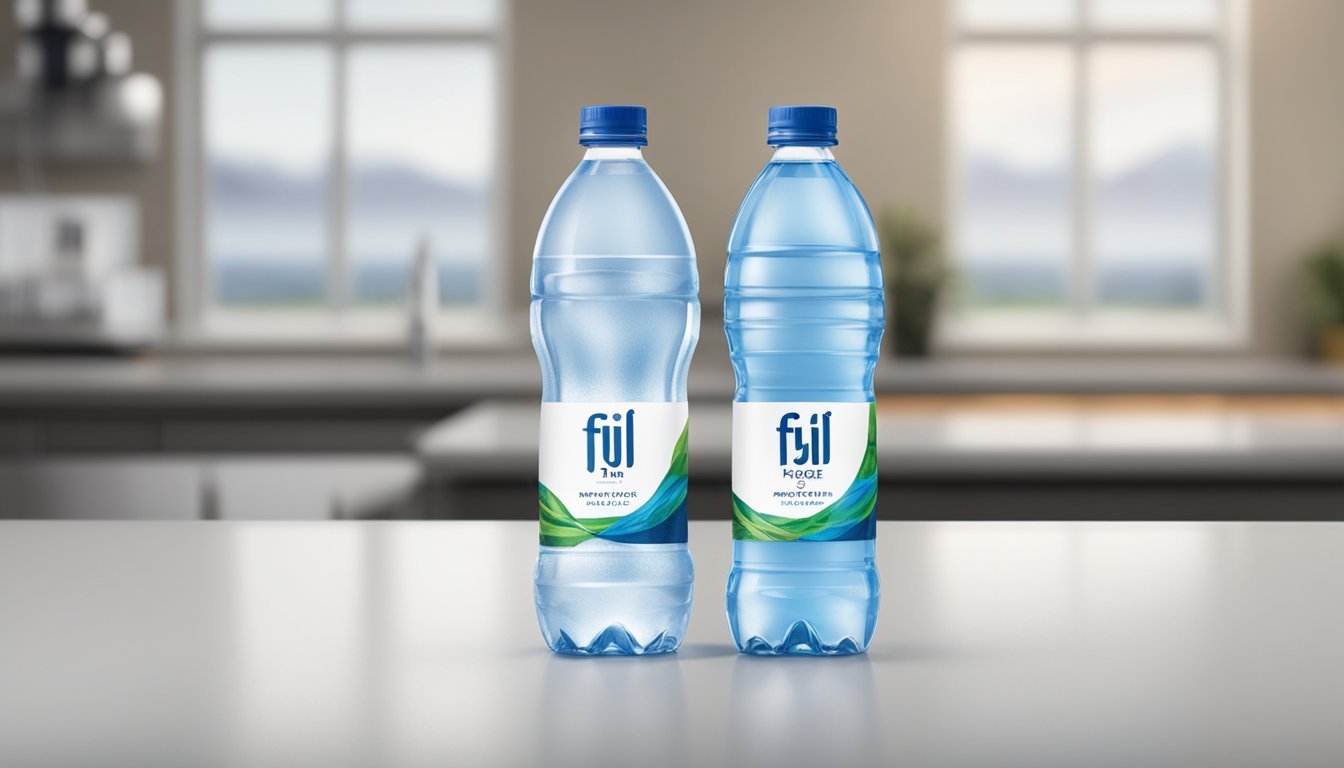Fiji vs. Kroger
Which Bottled Water is Better for You?
When it comes to choosing between Fiji and Kroger bottled water, consumers often find themselves at a crossroads. Fiji Water is celebrated for its natural artesian origins from Viti Levu in Fiji, offering a mineral-rich profile that many find refreshing and smooth. This premium water brand prides itself on its well-balanced pH levels and distinctive taste, attributed to the volcanic rock filtration process it undergoes.
Kroger bottled water, on the other hand, serves as a reliable and economical option for many households. It provides a clean and consistent taste, often sourced and purified locally, aiming to meet daily hydration needs without the premium price tag. While it may lack the exotic appeal of Fiji, Kroger water is readily accessible and offers practical benefits for budget-conscious buyers.
In this comparison, the choice boils down to personal preference and priorities—whether one values the luxury and unique sourcing of Fiji or the affordability and convenience of Kroger. By analyzing factors such as taste, cost, and sourcing, readers can make an informed decision about which bottled water best suits their lifestyle.
The Basis of Bottled Water Comparison
When comparing bottled water brands like Fiji and Kroger, it is essential to examine their properties and the health and safety standards they meet. Key factors such as taste, source, pH level, and mineral content are crucial.
Understanding the Properties of Bottled Water
Water Taste and Source:
Fiji Water originates from an artesian aquifer in Viti Levu, Fiji, known for its smooth taste due to natural mineral content. Kroger's bottled water varies, often sourced from natural springs or municipal sources subjected to purification processes.
pH Level and Minerals:
Fiji Water typically has a pH level around 6.96, leaning slightly acidic, while Kroger's pH level can vary but usually targets neutrality. Fiji includes natural silica, adding to its softness, whereas Kroger may add essential minerals for taste and health benefits.
Bottle Quality:
Fiji uses high-quality, BPA-free plastic bottles, focusing on preserving water purity. Kroger also ensures their bottles are safe and free from harmful chemicals but may not focus as heavily on premium materials.
Health and Safety Standards
Regulatory Compliance:
Both Fiji and Kroger bottled waters are regulated by the FDA and must comply with EPA standards. This ensures they are free from contaminants like lead, heavy metals, and pfas chemicals.
Purification and Testing:
Kroger often employs rigorous purification processes such as reverse osmosis or distillation to ensure cleanliness. Fiji relies on natural filtration through volcanic rock and consistent testing for purity.
Presence of Fluoride and Other Contaminants:
Fiji Water is naturally low in fluoride, while some Kroger varieties may add fluoride depending on the target market. Both brands regularly test for the presence of harmful contaminants to meet safety standards.
Profile of Fiji and Kroger Bottled Waters
Fiji and Kroger bottled waters offer distinct experiences. Fiji Water emphasizes its origins and natural filtration process, while Kroger's bottled water focuses on accessibility and adherence to safety standards.
Fiji Water: From Tropical Rain to Bottle
Fiji Water originates from an artesian aquifer in Viti Levu, Fiji. The water is naturally filtered through volcanic rock, collecting minerals like silica, which contribute to its silky mouthfeel.
The company markets itself as a premium brand, emphasizing its natural artesian origins. The isolation of the aquifer helps protect the water from pollutants. Fiji Water is often highlighted for its unique mineral profile and taste, making it a popular choice among those seeking high-quality bottled water.
Kroger's Bottled Water: Grocery Store Choice
Kroger's bottled water is designed to be accessible and affordable. It is sourced from various locations and may include processed groundwater. The water adheres to FDA regulations, ensuring it meets quality standards.
Kroger offers both standard and Simple Truth branded waters, with some options being BPA-free. The grocery chain prioritizes environmental concerns by offering recyclable bottles. Kroger water provides a cost-effective, safe option for those looking for everyday hydration options.
Taste Experience and Water Sommeliers
Taste in bottled water can be influenced by various factors, including mineral content and pH levels. Professional water sommeliers provide valuable insights into how these elements impact the drinking experience.
The Role of Minerals and pH in Taste
Minerals like calcium, magnesium, and potassium play a significant role in determining the taste of water. Fiji Water, sourced from an aquifer in Viti Levu, contains silica and a balanced mix of electrolytes, giving it a smooth mouthfeel. Kroger bottled water, often sourced from municipal supplies, undergoes filtration processes that remove impurities but may also strip away essential minerals, resulting in a cleaner but less distinctive taste.
pH levels also contribute to the taste profile. Alkaline water, typically with pH levels above 7, often tastes smoother and less acidic. Fiji Water has a naturally occurring pH of around 7.7, which aligns with the preference of many water enthusiasts. On the other hand, filtered waters like Kroger’s usually have a neutral pH level, making them less complex in taste but universally palatable.
Professional Assessments by Water Sommeliers
Water sommeliers evaluate bottled waters based on criteria such as minerality, pH balance, and overall flavor profile. Martin Riese, a renowned water sommelier, often highlights the subtle differences that minerals and pH levels bring to the tasting experience. He points out that the mineral content in Fiji Water provides a full-bodied taste, making it a favorite among premium water choices.
In contrast, budget-friendly options like Kroger might lack the delicate nuances preferred by connoisseurs. These waters are typically characterized by their straightforward and not overly complex flavor. Taste tests often reveal that while Fiji Water is enjoyed for its smoothness and richer texture, Kroger water is appreciated for its clean and refreshing quality.
Environmental Impact and Sustainability
Both Fiji and Kroger bottled water brands have distinct approaches to their environmental impact and sustainability practices. This section addresses key differences in their packaging choices and brand-led environmental initiatives.
Packaging: Plastic vs. Glass Bottles
Fiji Water primarily uses plastic bottles for their products. These plastic bottles, while convenient, contribute significantly to plastic pollution. Fiji Water bottles are made from polyethylene terephthalate (PET), which is recyclable but often ends up in landfills due to inadequate recycling practices.
Kroger, on the other hand, offers both plastic and glass bottle options. Glass bottles are more environmentally friendly since they are reusable and have a longer lifecycle. However, their higher cost and weight might make them less appealing to consumers.
Bottle Type Comparison:
Brand Bottle Type Environmental Impact Fiji Plastic (PET) High pollutant potential Kroger Plastic and Glass Lower pollutant potential, higher sustainability with glass
Eco-Friendly Approaches and Brand Initiatives
Fiji Water has initiated several programs to offset their environmental impact. Their initiatives include reducing the use of plastic and increasing the recyclability of their bottles. They've also invested in conserving Fiji's natural resources, such as protecting forests and preserving water sources.
Kroger’s approach to sustainability emphasizes reducing waste and promoting recycling. They offer incentives for customers who return glass bottles and have set goals for minimizing plastic use in their product line. Kroger is also engaged in broader environmental efforts, such as reducing carbon emissions and improving energy efficiency in their operations.
Key Initiatives:
Fiji Water:
Conservation projects in Fiji
Efforts to increase bottle recyclability
Kroger:
Plastic use reduction goals
Customer incentives for bottle recycling options
Purification and Filtration Methods
Fiji and Kroger bottled waters use distinct filtration methods that impact both quality and taste. It's essential to understand these methods to make an informed choice.
Understanding Different Filtration Processes
Fiji Water is sourced from a natural spring in Viti Levu, Fiji. This water passes through volcanic rock, naturally enriching it with minerals and electrolytes. This geological filtration contributes to its unique taste and mineral content.
Kroger bottled water, typically sold as purified water, uses a multi-step filtration process. This often includes reverse osmosis and carbon filtration to remove impurities and contaminants from tap water. This process aims to provide a consistent and clean product.
Natural Spring Water (Fiji): Enriched with minerals through volcanic rock.
Purified Water (Kroger): Uses reverse osmosis and carbon filtration.
Tap Water: Initial source before the extensive purification process.
How Filtration Impacts Quality and Taste
Filtration directly influences the water's purity and resulting taste profile. Fiji Water’s natural mineral content gives it a distinctive, smooth taste with a slight mineral-rich flavor. This is due to the natural spring water and geological filtration processes.
Kroger's purified water, typically subjected to reverse osmosis, offers a neutral taste, free from any trace contaminants. This method eliminates potential impurities but also removes natural minerals, making the water taste more bland compared to Fiji.
Mineral-Rich (Fiji): Natural taste from volcanic filtration.
Neutral Taste (Kroger): Reverse osmosis yields a clean but plain flavor.
Purity: Achieved through different but effective methods for both brands.
Pricing and Brand Positioning
When comparing Fiji and Kroger bottled water, both pricing and brand positioning play pivotal roles. Fiji markets itself as a premium brand, while Kroger offers more budget-friendly options.
Cost Comparison Between Fiji and Kroger
Fiji Water is priced higher than most bottled water brands. Retailing around $2.50 per bottle, the brand justifies its cost through high-quality perception and exclusivity.
Kroger, as a store brand, typically prices its bottled water significantly lower. A comparable bottle might cost around $1.00, making it an economical choice for budget-conscious consumers.
Brand Price per Bottle Fiji $2.50 Kroger $1.00
Fiji's higher price point stems from its sourcing and marketing as a premium option, while Kroger focuses on affordability.
Understanding the Premium Water Market
The premium water market targets consumers seeking higher quality and exclusivity. Fiji capitalizes on its unique sourcing, bottling water from a remote location, and positions itself as a luxury brand.
This strategy appeals to consumers willing to pay extra for perceived benefits such as taste and purity. In contrast, Kroger does not compete in the premium market. Instead, its strategy centers on providing affordable bottled water, appealing to a broader market segment.
By focusing on exclusivity and quality, Fiji secures a niche market. Kroger, with its competitive pricing, captures a more varied consumer base prioritizing cost over brand prestige.
More About Fiji
Fiji vs Mountain Valley Spring Water: Which Bottled Water is Better?
Fiji vs Whole Foods Italian Still Mineral water: Which Bottled Water is Better?





